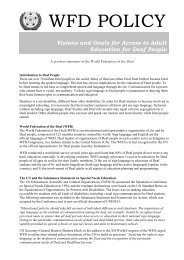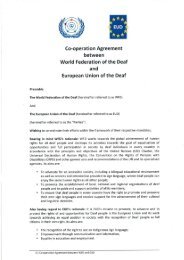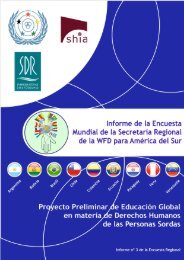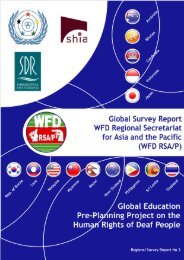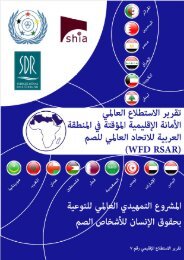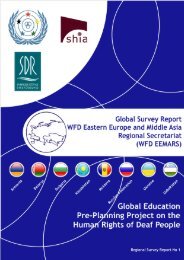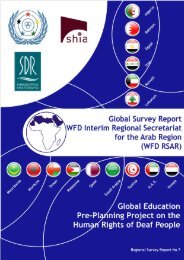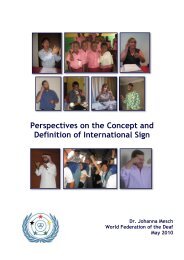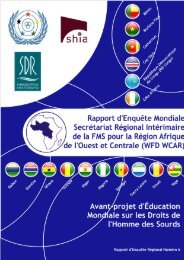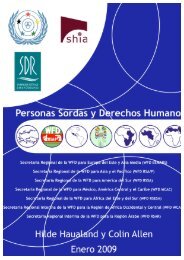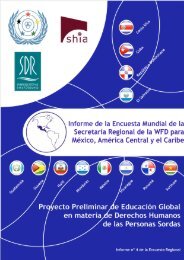Page No 1 - World Federation of the Deaf
Page No 1 - World Federation of the Deaf
Page No 1 - World Federation of the Deaf
You also want an ePaper? Increase the reach of your titles
YUMPU automatically turns print PDFs into web optimized ePapers that Google loves.
ten <strong>of</strong> 12 countries (83%) responded ‘Yes’ with a ‘<strong>No</strong>’ from Haiti and Suriname. The Regional Working Group, however,<br />
considered <strong>the</strong> chance that <strong>the</strong>se governments recognise <strong>Deaf</strong> people as equal as being very small; <strong>the</strong>y expressed doubt at<br />
<strong>the</strong> replies from those respondents who stated that <strong>the</strong>ir governments did.<br />
The next question asked whe<strong>the</strong>r each country has an <strong>of</strong>fice responsible for services for People with Disabilities, to which all<br />
<strong>of</strong> <strong>the</strong> country respondents answered ‘Yes’. Part <strong>of</strong> this question asked each country to provide contact details <strong>of</strong> this<br />
government <strong>of</strong>fice, and only Suriname did not; this information can be found on page 51.<br />
Nine <strong>of</strong> 12 countries confirmed <strong>the</strong>ir government has legislation or policy for <strong>Deaf</strong> People or People with Disabilities in<br />
general, and supplied a list <strong>of</strong> <strong>the</strong> laws or policies (see page 51). All <strong>of</strong> <strong>the</strong>se laws and policies classified <strong>Deaf</strong> people under<br />
<strong>the</strong> larger group <strong>of</strong> People with Disabilities, and none <strong>of</strong> <strong>the</strong>m addressed <strong>the</strong> needs <strong>of</strong> <strong>Deaf</strong> people as a group in itself.<br />
Guyana, Haiti and Suriname stated <strong>the</strong>ir current government does not have legislation covering <strong>Deaf</strong> people or People with<br />
Disabilities.<br />
Only seven <strong>of</strong> 12 countries (Costa Rica, Dominican Republic, El Salvador, Honduras, Mexico, Panama and Suriname) have antidiscrimination<br />
legislation for People with Disabilities (including <strong>Deaf</strong> people, as stated above.)<br />
Eight <strong>of</strong> 12 countries (Costa Rica, Cuba, El Salvador, Honduras, Mexico, Nicaragua, Panama and Suriname) stated <strong>the</strong>ir<br />
national governments provide services specifically for <strong>the</strong> <strong>Deaf</strong> Community through government departments; four countries<br />
(Dominican Republic, Guatemala, Guyana and Haiti) said <strong>the</strong>ir government does not provide any services for <strong>the</strong> <strong>Deaf</strong><br />
community. For those countries where <strong>the</strong> government does provide services, <strong>the</strong> types <strong>of</strong> services are:<br />
• <strong>Deaf</strong> Education<br />
• Hearing Aid Service<br />
• Sign Language Interpreting Services<br />
• Social Welfare (Financial Assistance)<br />
The opinion <strong>of</strong> current services <strong>of</strong>fered by governments is generally that <strong>the</strong>y are average but need to increase <strong>the</strong>ir<br />
sensitivity to <strong>the</strong> <strong>Deaf</strong> community’s needs as regards, for example, sign language interpreting services or better quality <strong>of</strong><br />
education for <strong>Deaf</strong> children.<br />
Those countries who stated that <strong>the</strong>ir government did not provide any service were requested to explain <strong>the</strong> reason for this;<br />
responses were along <strong>the</strong> lines <strong>of</strong> <strong>the</strong> government not having expertise in <strong>the</strong> provision <strong>of</strong> community services for <strong>the</strong> <strong>Deaf</strong><br />
community.<br />
Ten <strong>of</strong> 12 country respondents have contact with <strong>the</strong>ir country’s current government. The type <strong>of</strong> contact is linked to <strong>the</strong><br />
Ministries and/or Government Agencies dealing with <strong>Deaf</strong> people’s welfare needs. Three countries (Costa Rica, Cuba and El<br />
Salvador) have membership status within <strong>the</strong> governmental committee on issues for People with Disabilities.<br />
Four <strong>of</strong> 12 country respondents (Costa Rica, Cuba, Guatemala and Honduras) receive funding from <strong>the</strong>ir national government<br />
with eight (Dominican Republic, El Salvador, Guyana, Haiti, Mexico, Nicaragua, Panama and Suriname) not receiving any<br />
government financial support at all. Those countries receiving government funding provided <strong>the</strong> annual amount <strong>the</strong>y received<br />
(see page 54) and explained <strong>the</strong> purpose <strong>of</strong> <strong>the</strong> financial support.<br />
The last five questions <strong>of</strong> this section were to ascertain whe<strong>the</strong>r <strong>Deaf</strong> people have a right to vote in national, regional and<br />
local elections; are permitted to obtain a driver’s licence; can marry <strong>Deaf</strong> or o<strong>the</strong>r partners; are allowed to have children;<br />
and can adopt children. The results are as follows:<br />
Yes<br />
Right to vote in<br />
national,<br />
regional and<br />
local elections?<br />
12 Countries<br />
(100%)<br />
<strong>No</strong> 0<br />
Allowed to obtain<br />
a driver’s licence?<br />
10 Countries<br />
(83%)<br />
2 Countries<br />
(17%)<br />
Allowed to marry<br />
<strong>Deaf</strong> or o<strong>the</strong>r<br />
partners?<br />
Allowed to have<br />
children?<br />
12 Countries<br />
(100%) 12 Countries (100%)<br />
0 0<br />
Unknown 0 0 0 0<br />
4.4 Access to Government Services<br />
Based on 12 respondents<br />
Allowed to adopt<br />
children?<br />
10 Countries<br />
(83%)<br />
1 Country<br />
(8%)<br />
1 Country<br />
(8%)<br />
When asked whe<strong>the</strong>r <strong>Deaf</strong> people have access to government services such as education, health care, employment, social<br />
welfare and o<strong>the</strong>r general government services, nine <strong>of</strong> 12 country respondents ticked ‘Yes’. The question asking how <strong>Deaf</strong><br />
people access <strong>the</strong>se government services was generally not answered correctly; only a couple countries stated that <strong>the</strong>y have<br />
laws guaranteeing <strong>the</strong>se services to <strong>Deaf</strong> people and that part <strong>of</strong> equal citizenship is that <strong>Deaf</strong> people are eligible to access<br />
government services.<br />
Ano<strong>the</strong>r aspect <strong>of</strong> access to government services was whe<strong>the</strong>r <strong>Deaf</strong> people were entitled to any financial assistance from <strong>the</strong><br />
government, to which nine <strong>of</strong> 12 respondents (Costa Rica, Cuba, Dominican Republic, El Salvador, Guatemala, Guyana,<br />
The Project was under <strong>the</strong> auspices <strong>of</strong> <strong>the</strong> Swedish National Association <strong>of</strong> <strong>the</strong> <strong>Deaf</strong> (SDR) and <strong>the</strong> <strong>World</strong> <strong>Federation</strong> <strong>of</strong> <strong>the</strong> <strong>Deaf</strong> (WFD), <strong>Page</strong> <strong>No</strong> 17<br />
and funded by <strong>the</strong> Swedish Agency for International Development Cooperation (Sida) and Swedish Organisations’ <strong>of</strong> Disabled Persons<br />
International Aid Association (Shia).



